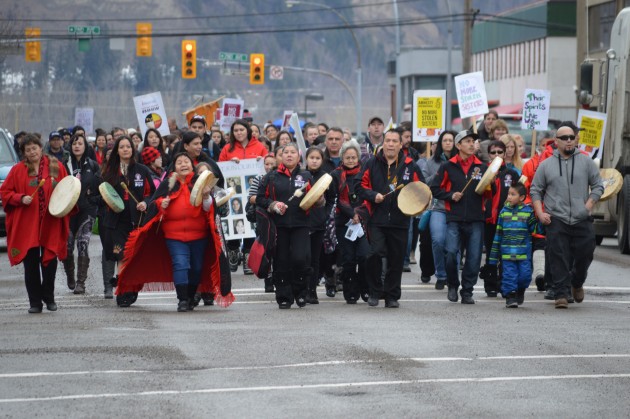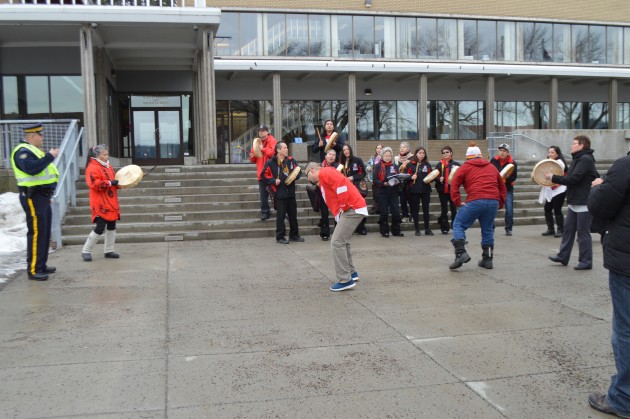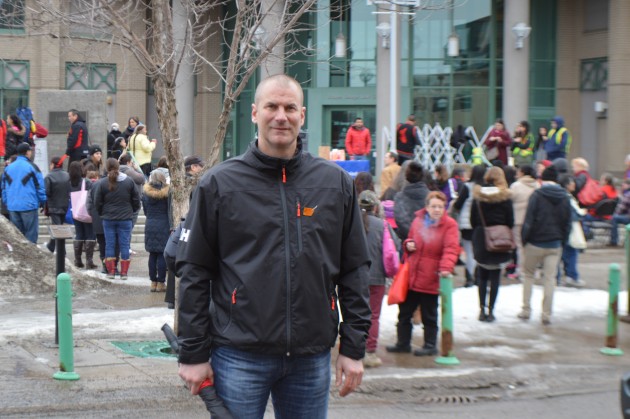Women’s Memorial Marchers Seek Resolution

Women’s Memorial March moves from Third Avenue to Victoria Street Saturday. Photos 250News
Prince George, B.C. – Members of the First Nations community were joined by supporters for the second annual Women’s Memorial March for missing and murdered women which took place Saturday in Prince George.
A large crowd gathered outside the Prince George courthouse to listen to a number of speakers who addressed the fact that so many women, both aboriginal and non-aboriginal, have vanished without a trace or have been found after dying at the hands of another person.
Brenda Wilson (photo right) with the Highway of Tears Initiative told the crowd “having the
Wilson’s sister went missing in Smithers in 1994, her body found ten months later in a shallow grave near the Smithers Airport. “Her killer is still out there, whoever did that to her has never been convicted or anything. We’re still trying to find answers in what happened to her. And I know I’m not the only person or family that is going through that situation.”
“Many of these cases go over twenty years. For my sister this year will be twenty-two years, and I just can’t believe it has taken this long for the government to recognize that this is a serious situation for our aboriginal women. We do this work so that we can walk safely on our streets and our highways, and that our children and grandchildren can have a future” of safety. “They should not have to be afraid to walk down these streets, and it’s not o.k. for them to be slapped, called names or to be violated.”
Wilson said Saturday’s march was strategically put together to go past four specific fundamental institutions within our community. “Our society needs to look at our different systems, such as the justice system. We’re here (at the courthouse) because we want to show them that the justice system that is in place right now doesn’t work.”
“Then we’re going to go up past the RCMP office and let them know that that system doesn’t work either. And the next place that we’re going to walk by is MCFD (Ministry of Children and Family Development) because that is a place where our children are being taken away. And they need to know that we’re not happy with that either.”
“And the last place is City Hall. We’re going to walk by there because we need their support. We need them to stand beside us and let them know that we need all the help that we can get.”
Several other speakers addressed the crowd prior to the march, repeating that message that too many women have vanished or been killed with no resolution to their plight. A spokesperson for the Moose Hide Campaign said that men need to be part of the solution and “speak out, to change peoples’ way of thinking.” And he said that applies not only to what has been happening to women but to children as well. He says “they need to be protected, they are our future.”

Khast’an Drummers in front of City Hall
The police-escorted march proceeded up Third Avenue to Victoria, left along Victoria past the RCMP detachment, left from Victoria onto 7th Avenue, down to City Hall where the Khast’an Drummers sang and drummed below the front steps of the Hall, and then made its way back along George Street to the courthouse.
One of the people who began the march at the courthouse and completed it there was the head of the Prince George City RCMP Detachment, Superintendent Warren Brown. He acknowledged that it was a sizeable group that took part in the march and added “it’s a real variety and diversity of people from our community and it demonstrates the willingness for our community to work collaboratively for a common goal. We as the RCMP feel that we’re a critical piece of this but not the only piece, so that’s why we’re here today showing our support.”
Supt. Brown says trying to resolve the large number of wising and murdered women cases is huge. “It is massive,” he says “and it’s complex. If it was easy we’d have it figured out. But the common theme and message I hear from many is not having closure and the journey to that end. I think it’s important that we continue to maintain, improve established relations for these folks to let them know that we, too, haven’t forgotten.”
Supt. Brown says the fact is that where we are living has a lot to do with this entire question. “In the north here we have our challenges because of the geographic nature of our communities and how far apart (they are) and I think we need to continue to be innovative and supportive to minimize those gaps that exist.”

Prince George RCMP Superintendent Warren Brown in front of courthouse
“I can speak on behalf of the RCMP here in Prince George and not only the missing and murdered women investigations carry on but so do all of our unsolved cases here. We, like many police forces across the country, have challenges with resourcing however we remain committed to carrying on with these investigations.”
“I think we have to know where we’ve come from, the past is important to realize that we’ve got to do better than perhaps we’ve done in the past and, if we’ve made mistakes, to learn from those mistakes and as well, to get input from these partners, our friends in the community to know where to go.”


Comments
Comments for this article are closed.